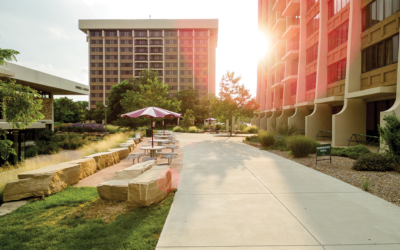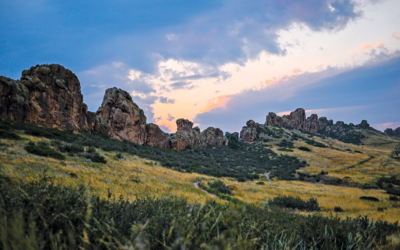When Brendon Williams-Ransdell came out as gay, not all of his family members were supportive. One of his proudest moments came when his 80-year-old grandmother yelled at one of his cousins who didn’t want to accept him.
He now lives in Fort Collins, but he grew up in Sterling, a rural, conservative city. He took solace in the family members who defended him, like his grandmother, and tried to be understanding when others weren’t.
It’s OK for family members to struggle with it, says Williams-Ransdell, the community organizer for The Rainbow Circles, a nonprofit based in Fort Collins that offers queer-based therapy from other LGBTQ+ community members. And yet there are many ways for family members to be supportive and loving, even if they still have hard questions. They can also find support themselves. A little leeway on both sides goes a long way, Williams-Ransdell says.
“Families will make the difference,” he says, “especially if it’s a teenager.”
Affirming their identity
There are many reasons why people may not be supportive of their LGBTQ+ family members, whether that’s because of their religion or, in Williams-Ransdell’s case, where they live. But many times, family members feel uneasy just because they don’t know how to act or what to say, he says. The first step to being supportive, he says, is just to say you love them, even if you’re struggling to agree with their lifestyle.
“Affirm, affirm, affirm,” Williams-Ransdell says. “Make sure they know that you still love them and want them to find their own path. Even if you think it’s the wrong path, being affirming can make such a difference.”
Sometimes being a good ally means it’s OK to admit you don’t know everything. Gender identities, for instance, can be tricky: Some who aren’t transgender prefer gender-neutral pronouns such as “they.”
“If you say something wrong, like use the wrong gender, just apologize and move on,” Williams-Ransdell says.
Sometimes this was his own family, but he was patient with them because of the advice he was given by other members of the LGBTQ+ community.
“It took so much learning on their end,” Williams-Ransdell says, “but they did put in that work, and we have a closer relationship now.”
Parents, Families and Friends of Lesbians and Gays (PFLAG) is touted as the largest nationwide organization that supports LGBTQ+ members, with chapters in Fort Collins and Greeley. They exist partly to help family members, especially parents, navigate the hard questions many have. The Fort Collins chapter started in 1994, and Greeley’s chapter was founded in 2015.
“I joined more for me than for her,” says Reggie Johnson, president of the Fort Collins chapter, who has a trans daughter who is now 34. “Many times parents don’t know how to respond. That was me. When their own kid comes out, they get the deer-in-the-headlights look.”
Johnson, a grandmother, says the amount of support and encouragement from the many different organizations in Northern Colorado can be comforting, both for family members and for the person coming out, as they adjust to the person’s new identity.
Educating yourself
Nate Lamkin of Fort Collins had nothing but acceptance for his 16-year-old son, Arthur, when he came out last year as a trans male. He was supportive, partly because he was afraid for Arthur’s life.
Lamkin works as a social worker in the healthcare system and spent some time working in an emergency room. He saw teens struggling with suicidal thoughts nearly every time he was there.
“Trans teens are at a higher risk,” Lamkin says. “I had a front-row seat to that. I knew that to not accept him for who he is would put his life at risk.”
His family has experienced positive and negative treatment, but his synagogue was accepting and so were their friends. Parents of trans kids can especially benefit from support groups, he says, as there’s a lot to learn.
Lamkin found support in PFLAG’s group for fathers of trans youth, including a half-day session he refers to as “Trans 101.” Even supportive parents admit to struggling with genders and pronouns and adjusting to their child’s new appearance. This is especially true for family members who aren’t parents.
“I had to learn the language,” Lamkin says. “I didn’t know what it meant to be a good ally.”
Johnson says parents who try to be supportive of their LBGTQ+ kid shouldn’t worry too much.
“When they do a little to help their kid, it makes a huge difference,” Johnson says. “The hardest part for PFLAG is reaching out to parents who don’t want to try.”
Support groups not only help parents, but they can also release the burden of their children educating them on the details.
“It shouldn’t be their responsibility,” Johnson says of LGBTQ+ youth. “They have enough to worry about.”
Sometimes parents come out and still need to offer support to their kids. Andromeda D’Angelo Stanfield (they/them) was married to a conservative man but is now a LGBTQ+ member in Greeley. They are also the president of Northern Colorado Equality, a nonprofit that aims to empower the LGBTQ+ community through advocacy and education.
D’Angelo Stanfield shares a son with their ex-husband, who lives in Texas. Their son stays with D’Angelo Stanfield over the summer.
“The hardest part is that he has two opposite parents,” D’Angelo Stanfield says. “I take him with me to Pride and just explain that no one there is going to hell and that his mom isn’t evil.”
Finding an accepting church (if applicable)
Rev. Ben Konecny, the head of staff at First Congregational Church of Greeley, knows his scripture, but he likes to use a simple argument when he discusses his church’s “open and affirming” policy toward the LGBTQ+ community.
“Jesus offended a lot of people who believed,” Konecny says.
More than a decade ago, the church’s congregation voted nearly unanimously for the “open and affirming” label, an official title in the United Church of Christ that means they welcome LGBTQ+ members, Konecny says. The label means more than “don’t ask, don’t tell.”
“It means that we are going on the record as not just neutral but kind,” says Konecny, who is not gay but says he’s an ally. “The message I hear is that others have been exclusive, so you need to be explicitly inclusive here.”
A few years ago, they welcomed Rev. Tamara Torres McGovern, a LGBTQ+ member, as a minister. Torres McGovern believes it was the first Christian church to do so in Northern Colorado.
“I do think my presence helps them feel welcome,” she says.
The church has grown since then, though Konecny says that’s not just because of the label: “[LGBTQ+] haven’t come flooding through the doors,” he says.
Life is especially difficult for LGBTQ+ members and their families when they face pushback from their communities. Churches are just one example where that can happen. In fact, family members may hear more negative comments than the person who identifies as LGBTQ+, D’Angelo Stanfield says.
Konecny reassures family members who are struggling with supporting LGBTQ+ loved ones and staying true to their religion that scripture can be interpreted a number of different ways.
“The anchor has to be Jesus,” he says. “So many times in these debates Jesus doesn’t get brought up. Even the ones who claim to be literalists are selectively so.”
His own beliefs, and what he preaches, are grounded in the text, he says, and even literal translations of the text can mean more than one thing as our knowledge about it increases. But our ever-changing world should also offer guidance.
“We are advancing in ways to advance the world around us,” he says, “and that has always resulted in traditions being threatened by that. Slavery was once supported by the text.”
Spending time in safe spaces
When Northern Colorado’s last so-called gay bar closed 13 years ago, Leanna Valadez and friends like her didn’t have anywhere to go to have fun with other members of the LGBTQ+ community.
“It was upsetting me enough that I wanted to do something about it,” says Valadez, who came out as gay when she was 21.
In response, Valadez opened her own LGBTQ+ hangout spot, R Bar, in 2015 in Fort Collins. She’ll celebrate the business’ 10th anniversary this fall.
R Bar may be, at least officially, the only bar in Northern Colorado that caters specifically to LGBTQ+ folks. It offers a place where others in the community can unwind without needing to go to a church or a support group.
“They know that they’re most likely among people who are like-minded,” Valadez says.
The bar welcomes straight, cisgender people as well, Valadez says, and a third of her customers are straight. But it’s obviously a gay bar: The decor is like “rainbow Christmas,” she says.
“I’m a little different in our community in that I don’t want that segregation,” she says. “I’d be a hypocrite if I didn’t welcome you because that’s what happens to us.”
Her goal is to host a fun, peaceful community, but bars can’t always achieve that. The LGBTQ+ community isn’t always one big happy family. But Valadez, like any good bartender, listens for trouble and asks people to leave when someone starts it. That’s pretty rare.
Once a month, Valadez hosts a networking group for LGBTQ+ members who want to do business with each other, and she hosts a dance party that night.
“Even now, they say it’s hard to find a place where they can just dance,” Valadez says. “This is a college town, and it can get kind of bro-y. Even straight women like to come to get away from that. This is a place they can have fun.”
Konecny and Torres McGovern may run a Christian church in Greeley, a city known to be conservative, but the point isn’t to make LGBTQ+ the central focus, Konecny says. Life shouldn’t be that way either.
“People have said they want to be in a community, a church, that’s larger than just LGBTQ+ people,” he says. “My sense is people are just looking for a place where a family can be their family.”
Quick Tips
Have patience. It takes time to accept a big change in a loved one’s life. Everyone should be patient with each other.
Make an effort to understand. Read books, ask questions of your LGBTQ+
loved one and question your own opinions.
Apologize (and accept those apologies). If you misgender someone or call a trans person by the name they used before they transitioned, apologize and move on. It’s tricky, and LGBTQ+ members should try to not take it personally.
Seek out support. There are many organizations in Northern Colorado that offer resources, support groups and tips from those who have been through something similar. Take advantage of them. Therapy is also a must.
Affirm. Offer your love and support even if you don’t agree with all their life decisions.
Pride Month Events
These are just a few of the major events around Northern Colorado, though there are many others. See a running list of all the events at nocosafespace.com/pride-guide.
Fort Collins Pride: June 1 at various locations, with many activities from noon-4 p.m. in Library Park.
Sam’s Rainbow Run (5K Run/Walk): 7 a.m. June 14 at The Oval in Fort Collins.
Loveland Pride: 4-8 p.m. June 20 at Mehaffey Park.
Fort Collins Pride Bar Crawl: Check-in is from 4-8 p.m. June 21 in Old Town (the event goes until 10 p.m.).
Greeley Pride 2025: Noon-5 p.m. June 28 at the Aims Welcome Center.
Denver Pride Parade: 9:30 a.m. June 29 at 17th Avenue and Franklin Street, concluding at Lincoln Street (the parade will feature several Northern Colorado organizations).
Northern Colorado Pride 2025: 11 a.m.-5 p.m. Aug. 10 at Island Grove Event Center in Greeley.







